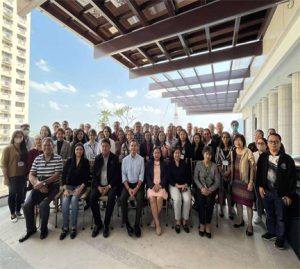
The Department of Environment and Natural Resources (DENR) is tapping faculty members of state universities and colleges (SUCs) and Higher Education Institutions (HEIs) nationwide to join its pool of experts tasked to review the environmental impact assessment (EIA) of proposed development projects.
The DENR, through its Environmental Management Bureau (EMB), conducted on April 27 an orientation and training on the country’s Environmental Impact Statement (EIS) system for 50 faculty members with relevant expertise in social sciences and technology from 23 different SUCs and HEIs in Luzon. The agency plans to conduct similar trainings in Visayas and Mindanao soon.
EIA is a process for anticipating the effects on the environment caused by a development, while an EIS is the document produced as a result of that process.
An EIS is prepared and submitted by the project proponent or EIA consultant that serves as an application for an environmental compliance certificate (ECC). It is a comprehensive study of the significant impacts of a project on the environmental management plan that the proponent will fund and implement to protect the environment.
According to Undersecretary for Integrated Environmental Science Carlos Primo David, the DENR Central Office in Quezon City currently has only around 30 active EIA reviewers.
He said the DENR recognized the need for third party EIA reviewers and the faculty members of SUCs are the first that came to mind.
“With the training that we did, it will more than double the number of EIA reviewers we have. We are tapping the expertise of these academic institutions to help in the work of the DENR. This will hasten our processing time, at the same time, review environmentally-critical projects with the proper expertise required,” David pointed out.
The review of EIS requires comprehensive and in-depth analysis that includes the evaluation of the accuracy and completeness of data, the soundness of the analysis, and the appropriateness of the proposed mitigation measures.
During the orientation, participants were given an overview of the EIA, the Philippine EIS, its implementing rules and regulations or IRR, and other related policy issuance. They were also briefed on the ECC application requirements and the integration of disaster risk reduction and climate change adaptation into the EIA.
The event also served as a venue for the DENR and invited participants to have a meaningful dialogue on the roles and responsibilities of EIA reviewers.
DENR-EMB Director and concurrent Assistant Secretary for Field Operations Gilbert Gonzales stated that the expansion of EIA reviewers is needed for a more efficient and effective review of EIS, and to boost EMB’s compliance with the prescribed processing time for ECC applications.
Under the DENR Administrative Order 2003-30 or the IRR of the Philippine Environmental Impact Statement System (PEISS), the EMB is the primary agency responsible for implementing PEISS, and may commission independent professionals, experts from the academe, and representatives from relevant government agencies as members of the EIA Review Committee (EIARC).
EIARC is a body of independent technical experts and professionals of known probity from various fields that evaluates EIA reports and provides appropriate recommendations regarding the issuance or non-issuance of an ECC.
